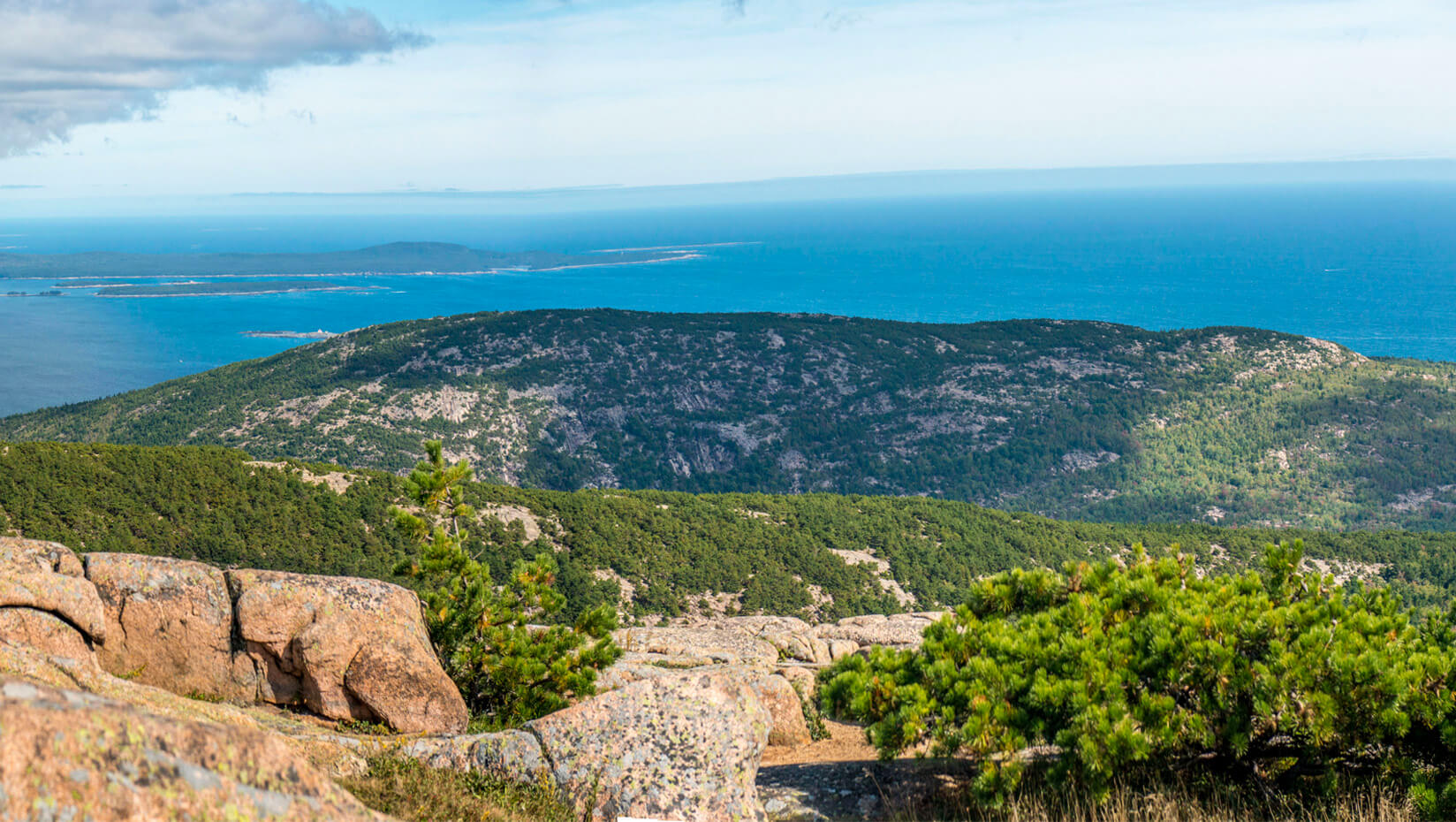
MacKenzie aims to coordinate conservation efforts for Maine mountaintops
Each childhood spring, Caitlin McDonough MacKenzie and her grandmother had a picnic on the day rhododendrons bloomed in her family’s yard in Massachusetts.
MacKenzie, now a postdoctoral David H. Smith Conservation Research Fellow at the University of Maine Climate Change Institute, continues to relish “botanizing,” as she calls it.
She is one of five emerging scientific leaders awarded a prestigious 2017 Smith Fellowship — the conservation science program aimed at finding solutions to pressing conservation challenges by bridging the gap between theory and application.
MacKenzie is addressing the threat that climate change poses to Maine mountain habitats — including the spectacular summits that attract tourists and hikers.
Warming temperatures may cause the tree line to move upslope, says MacKenzie, eliminating habitat for alpine and subalpine vegetation communities that are at the southern edge of their respective ranges and are isolated by topography, ecology and management.
These “islands of habitat above tree line” are scattered across mountains owned and managed by federal and state agencies and nongovernmental organizations, each of which has varying conservation mandates and resources.
Due to a dearth of scientific studies of New England’s alpine habitats, MacKenzie says there’s a gap in understanding about how plant communities above tree line will respond to human-caused climate change.
So she’s exploring the hidden history of two of Maine’s iconic mountains — Sargent Mountain and Mount Katahdin — since the Laurentide Ice Sheet retreated around 17,000 years ago.
Her project is titled “Conservation Challenges for Tundra Refugia under Climate Change: A Paleoecological Perspective on Subalpine and Alpine Vegetation in Maine.”
In the fall, MacKenzie retrieved sediment cores from Sargent Mountain Pond. The small, shallow body of water near the top of Sargent Mountain (elevation 1,373 feet) in Acadia National Park may have been the first lake to form in the area now called Maine when the ice sheets receded.
Sediment cores are ecological archives in that pollen and plant fragments preserved in the lake bed layers are records of vegetation changes over time. Thus, analysis of the cores — and the pollen in them — will shed light on changes in climate for thousands of years.
In February, she’s slated to extract sediment cores at Chimney Pond in Baxter State Park.
“This project will bring a much-needed long-term perspective to our understanding of alpine and subalpine vegetation in Maine, including how alpine and subalpine plants responded to past abrupt warming events,” she wrote in her proposal for the Smith Fellowship.
In 2019, she plans to share her findings at the Northeast Alpine Stewardship Gathering, where she’ll seek to coordinate conservation efforts for Maine areas above tree line experiencing human-caused climate change.
“Our mountaintops are well protected from an old-school perspective. National forests, national parks, Baxter State Park and other state entities own and manage Maine’s mountaintops,” says MacKenzie.
“But, if the climate continues to warm, forests from lower elevations will migrate upslope and our unique, open alpine and subalpine habitats may disappear. We need everyone who works in these environments to come together and share research and resources as we manage these special places for future generations.”
MacKenzie’s research, like that of the other fellows, is conducted in partnership with a major academic institution and an on-the-ground conservation organization.
Her mentor is UMaine paleoecologist Jacquelyn Gill and her partner is Abe Miller-Rushing of the National Park Service. MacKenzie’s field sites are in Acadia National Park and Baxter State Park.
She recently took part in a retreat in Washington, D.C. with the other fellows — whose research topics range from seed mix design for ecological restoration in the tallgrass prairie to freshwater floodplain restoration. While in the nation’s capital, she met with U.S. Sen. Angus King and had policy and media training.
MacKenzie also recently led a group of Smith Fellows to draft a public comment in response to the National Park Service’s proposed targeted fee increase, then she penned an op-ed that ran in the Bangor Daily News encouraging others to do the same.
She earned her bachelor’s in environmental science and public policy at Harvard University, her master’s in ecological planning at the University of Vermont and her doctorate in biology at Boston University.
As a doctoral student at BU, MacKenzie sifted through historical ecology data — including herbarium specimens, field notebooks, photographs and old floras — of 19th-century botanists. And she learned about species loss and shifts in spring flowering and leaf out in northern New England plant communities.
Her first experience above tree line was on a summer camp youth hike. MacKenzie marveled that she could be in a fascinating different world after just a two-hour drive and two-hour hike. She enjoyed the atmosphere so much that she later worked and lived as an Appalachian Mountain Club naturalist above tree line — where it’s too cold and windy for trees to grow.
Her interest in botany and ecology blossomed during the annual picnics with her grandmother — the same grandmother who gave her an American Girl Doll named Samantha Parkington for her ninth or 10th birthday.
Parkington — who came equipped with a wicker backpack, butterfly net, sketchbook, watercolor brush and tiny plant press — also came with a set of books detailing her upper-class Victorian-era life. One story was set at a remote New England summer retreat and that tiny piece of Parkington’s story introduced MacKenzie to natural history and botanizing.
“With Samantha, I grew up to be what I was pretending to be,” says MacKenzie, who delivered a Piscataquis River TEDx talk about “botanizing” in September 2017.
MacKenzie plans to continue the tradition of botanizing and picnics with her 2-year-old daughter Mara. “She’s already been a part of my dissertation fieldwork collecting phenology data in Acadia. I hiked with her in a baby backpack,” says McKenzie, adding that Mara also loves the old Samantha Parkington doll and her botanizing accessories.
Contact: Beth Staples, 207.581.3777
